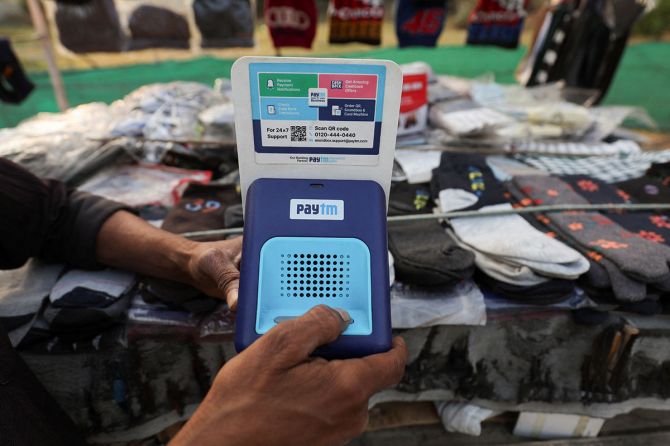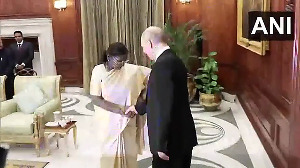Going by the RBI directive and the overall narrative, Paytm may have lost the rigour of stress tests, audits and compliance.

Coldplay's A Sky Full of Stars reverberated in the large conference room of Paytm's Noida headquarters in the summer of 2016. On May 31, 2016, to be precise.
Vijay Shekhar Sharma, founder and chairman of One97 Communications -- the parent company of Paytm -- took on the role of DJ himself to bring cheer into the room before starting a presentation on the company's payments bank road map.
Though many of the companies that had secured payments bank licences had exited the sector, finding the regulatory environment hard to handle, Sharma told the media during the presentation that the payments bank would be his group's top driver.
To a question on whether there were regulatory challenges in banking, Sharma's reply was: "Not now, unless roadblocks come later. On KYC (know your customer), we are talking to the regulator to understand the rules..."
To a follow-up question on whether he had concerns that many banking licensees had dropped out, he again put up a brave front, saying: "Not at all. People have to discover their business models. Ours is sorted. We may bring a new banking business to the world along with the Reserve Bank of India."
Paytm Payments Bank got the licence in January 2017 and began operations in May that year.
Seven years later, Sharma's startup-turned-financial heavyweight, with years of backing from Chinese tech major Alibaba, along with related entities and Japanese inv-estment firm SoftBank, finds itself cornered over serious regulatory violations centred around breach of KYC and anti-money laundering (AML) norms, suspicious mule accounts, as well as inter-mingling of businesses, thereby not adhering to arm's length distance rulebook.
The RBI directed Paytm Payments Bank to stop almost all operations, including taking new deposits and transactions after February 29.
Compliance conundrum
Such violations were found earlier too, but, despite regulatory red flags and audits, the company showed little evidence of compliance, according to sources in the know.
The commentary around the latest development is even pointing towards the possibility of Paytm Payments Bank losing its licence -- that, if it happens, is interpreted by the industry as an unusual and extraordinary move.
So far, reactions within the government suggest some steps against the regulatory violations, stopping short of a clear direction.
Revenue Secretary Sanjay Malhotra has said in media interviews that the Directorate of Enforcement would initiate a probe if any fresh charges of fund siphoning are found.
Malhotta told Business Standard no information of money laundering linked to Paytm Payments Bank had come to the revenue department so far.
Rajeev Chandrasekhar, minister of state for skill development and entrepreneurship, and electronics and information technology, told reporters fintech firms were not above regulation, nor were they exempt from oversight.
Union Finance Minister Nirmala Sitharaman, in her post-Budget interviews, refrained from commenting on the Paytm issue, but said the government was very enthusiastic about the fintech world and would like to engage with more shareholders in that space.
Responding to the findings on the many violations that resulted in the RBI stopping the Paytm Payments Bank services, a company spokesperson sent a statement.
'The recent direction from the RBI is a part of the ongoing supervisory engagement and compliance process.
'The bank always upheld compliance and supervisory instructions in its interactions with the regulator from time to time, the statement said.
Also, in a late night statement on February 4, 2024 to the National Stock Exchange, One97 Communications denied all 'speculation' around money laundering activities and any ED investigation into the matter.
Sharma, when contacted, declined to comment. But soon after the RBI's directive, the 45-year-old entrepreneur had put up an optimistic post on X.
'To every Paytmer, your favourite app is working, will keep working beyond February 29 as usual...'
He went on to say that for every challenge, there was a solution and that India will keep winning global accolades in payment innovation and inclusion in financial services with 'PaytmKaro' as its biggest champion.
With Sharma and his top team busy with other banks to transfer payments and settlements from Paytm Payments Bank, the merchants' community is in a tizzy trying to resolve any uncertainty that may surface in the payment space after February 29.
Confederation of All India Traders, for instance, has sent out advisories to all members on how to deal with the 'impending crisis'.
In all, Paytm powers more than 30 million merchants and businesses. More than 300 million customers use Paytm to pay at stores.

Beacon in cashless times
Paytm, which now has competition in the form of other platforms, such as PhonePe and Google Pay in UPI (unified payments interface) payments, experienced a meteoric rise after the government's demonetisation move on November 8, 2016.
It had started operations sometime in 2010, but the wallet service found critical mass six years later, after high-denomination currency notes (Rs 500 and Rs 1,000) were withdrawn.
'PaytmKaro' turned into a moniker of sorts in India's cashless times. There was a Paytm Payments Bank connect there, too.
In an interview with Business Standard in December 2016, Sharma was asked how Paytm coped with so much demand for cashless transactions soon after demonetisation.
He replied that the servers that were ready to roll out for the payments bank came in handy.
Since there was a delay in Paytm getting the bank licence from the RBI, the payments bank plan was shifted to the middle of 2017. Till then, it had the wherewithal to handle the mass traffic.
"The technology teams were proactively ready... We were preparing the platform and machinery for the payments bank.
"We used those servers and systems already there and did not have to acquire new ones," Sharma had said.
He also spoke about the systems getting secure, audits getting done, and going through the stress test drill to be ready for the payments bank.
Going by the RBI directive and the overall narrative, Paytm and Sharma may have lost the rigour of stress tests, audits and compliance in the years that followed.
Sharma's popularity on social media may have soared with his photographs alongside prominent personalities cutting across politics and businesses, but the latest RBI crackdown dealt a blow in the real world -- a washout of Rs 17,000 crore (Rs 170 billion) in the stock market in just two days.
Is it time for a reset? Is there time for a reset?
Feature Presentation: Ashish Narsale/Rediff.com










